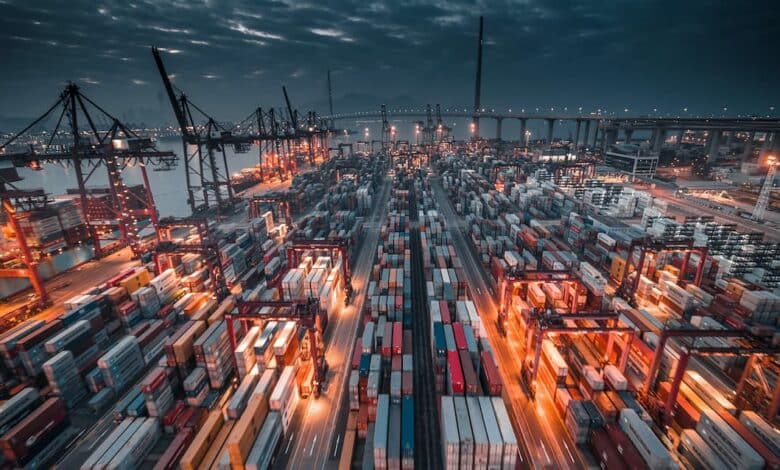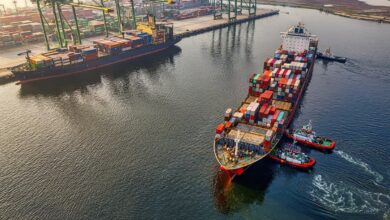Port strikes threaten to Cripple Christmas

Australia has been dealing with overtime and other bans at ports around the country. Last week a strike action at Port Botany was announced on a major pre-Christmas Industrial campaign.
Then late on Friday, the Maritime Union of Australia has actively launched nationwide strikes at Patrick Terminals sites in Brisbane, Fremantle, Melbourne, and Sydney, in what the operator of the maritime container terminal called “bewildering.”
There will be embarking nationwide action and work bans at the largest container terminals in Australia, with strikes every Monday, Wednesday, and Friday of October and impacts across all other days of the month.
Patrick Terminals CEO Michael Jovic says the company has been negotiating with the union since February 2020 and has held nearly 70 meetings to finalize a new company agreement.
They offered the union a 2.5 percent increase in annual salary for four years.
“We have bargained with the MUA for over 19 months and have given a very generous pay rise, guaranteed no redundancies and made a commitment to preserved jobs,” Jovic said in a statement on Monday.
“They clearly have no intention to make a deal. They just want to do as much damage as possible to the company and the economy.”
Over 40% of all Australian freight containers go through Patrick’s terminals, and the impact of this selfish industrial activity affects all Australians.
Mr. Jovic says the strikes will have ramifications for all Australians in the lead up to Christmas, as more than 40 percent of all container freight passes through Patrick terminals.
“The MUA’s actions are frankly disconcerting. It seems to have completely lost the plot,” he said.
This blatantly aggressive strike shows that it does not consider the suffering of ordinary Australians who have experienced the effects of COVID-19 closures, unemployment, and restrictions in the last 18 months.
“It seems that the union is trying to deprive the Melbourne public of Christmas presents after all that Victorians have gone through over the past 18 months, it is truly mind-boggling.”
Patrick says he has also experienced record absenteeism on top of industrial action, with employees not showing up to work more than 7,500 times.
In Sydney, wharfies on a 35-hour roster earn an average of $ 172,124 a year and work less than 200 days a year, while the roster in Western Australia earns an average of $ 166,464 a year for about 180 days of work.
In the same number of hours of the week, Brisbane pays an average of $ 153,880 a year for 173 days, but Melbourne employees have less work (162 days) and bring home an average annual salary of $ 151,048.
MUA Deputy National Secretary Jamie Newlyn said management at Patrick had made a series of exaggerated and false claims about the breakdown of talks on a new agreement. Instead of suggesting that Christmas was at risk, the company should stop trying to alarm the public.
Mr. Newlyn said Patrick had claimed he would “renew” the existing EA but insisted on changes that employees would not accept, such as increased ambiguity limiting future safe employment opportunities.
“Patrick employees are rightly frustrated at corporate tactics of refusing a modest pay rise and removing previously agreed conditions on secure jobs,” he said.
Threat to cripple imports
Delivery delays caused by the COVID-19 and increased online shopping during this time could get worse as port strikes can delay Christmas deliveries.
The combined effects of COVID-19, the approaching peak season, and industrial activity meant “astronomically increased” delays, Jovicic said.
Planned strikes at Australian ports could paralyze imports before Christmas, potentially clearing toys, electronics, furniture, and food from shelves.
Jamie Newlyn said he did not believe the strike would cause supply problems.
‘The truth is that other cargo handling companies on the Australian coast are capable enough to load and unload cargo and do not accept that there is any threat that imported products will be short supply due commencement of protected industrial activities by our members.’ Mr. Newlyn said.
Melwyn Noronha, CEO of Shipping Australia, said: “Many Australians are unable to work due to lockdown. And is it now in these times of economic and health crisis that maritime unions are trying to paralyze the coast? Is it now the union that wants action that has adverse effect on everyday Australians?”
Global Forwarding founder and director Enrica Centorame said that in addition to border closures, industrial activity had led to freight backlogs of four to six weeks, and the escalation meant she was now facing eight to 12 weeks of delays.
“It’s cancer in the economy,” she said. “We are in the midst of a pandemic. Many companies are on their knees: they need their stock, and their stock is stuck in port.”
It is no exaggeration to say that the disruption of activities by unions will have an adverse impact on the lives of Australians daily. This can cause many problems for many who are not involved in the conflict. This is a disaster!



